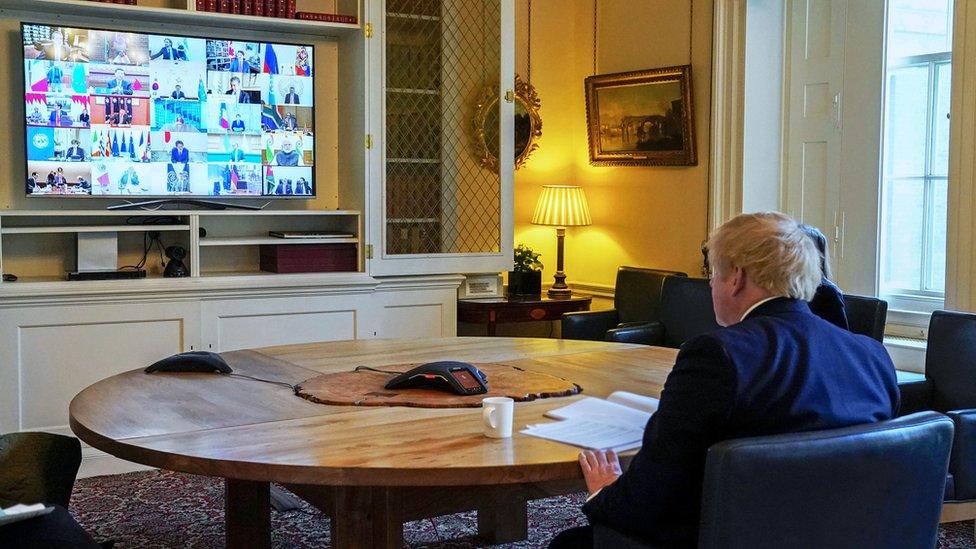Councillors call for online meetings to continue post-pandemic
- Published

Even Prime Minister Boris Johnson has been using Zoom to get work done in the pandemic - but local councils can no longer use the technology for their meetings
Councillors are calling for a law in the Queen's Speech to allow them to continue online meetings and "serve the best interests of our people".
Local authorities adjusted like most organisations during lockdown by moving their gatherings onto apps like Zoom.
But the emergency legislation allowing the move ran out on 6 May, leaving councils with Covid safety concerns.
The government has launched a consultation on remote meetings to look at potential "next steps".
But it said there had not been time to bring in legislation to extend it past the local elections - held last week - so it is not expected to feature when the government lays out its plans for the next Parliament in Tuesday's Queen's Speech.
A number of councils applied to the High Court to see if existing law would cover them continuing to meet online, but its bid was dismissed, with judges saying MPs would need to pass a new law.
Local online meetings hit the headlines in February after the fractious gathering of Handforth Parish Council, in Cheshire - featuring Jackie Weaver - went viral.
But there is a serious side to the meetings too, with many local representatives saying video conferencing opened up democracy to more people.
Chairman of the Local Government Association, Councillor James Jamieson, said the process was "more sustainable and easier to access" and had "allowed people who work during the day to participate".
He has the support of Mumsnet, with its chief operating officer, Sue Macmillan, saying the technology had made it more attractive for mothers to get involved.
"Parents of young children don't put themselves forward to be councillors," she said.
"The services that councils are responsible for are ones that affect local parents, and we want councils to be reflective of the communities they serve."
'Impossible situation'
Justin Griggs, from the National Association of Local Councils, said the decision by government had left local authorities in an "impossible situation", having to "navigate through changing guidance and rules" to make meetings safe, while continuing with business.
As a result, some councils will be suspending their meetings going forward and delegating decisions to officials, despite the democratic implications.
"While the government was right to praise councils for playing their part in the pandemic, it is wrong not to legislate to allow online meetings to continue," said Mr Griggs.
However, some councils have pledged to continue Zooming anyway - even without the law supporting them.
Viral moments like this Handforth Parish Council meeting could come to an end - but there are more serious reasons for concern too
Woughton Parish Council in Buckinghamshire has seen turnout increase from a handful of residents to upwards of 200.
Councillor Jordan Coventry said: "As a council we have decided that we are going to continue to meet online and serve the best interests of our people the best as we can.
"Why should we spend public money to rent a live space, when we are already one of the most deprived areas in our our local area, in order to comply with a frankly silly law?"
A Ministry of Housing, Communities and Local Government spokeswoman said they recognised that "in some cases remote meetings have widened access to local democracy and enabled councils to conduct essential business throughout the pandemic".
But she said the government "also has an important role in ensuring meetings continue to have arrangements in place that strengthen scrutiny and transparency in councils".
She added: "That's why the we have launched a call for evidence on remote meetings and their use during the pandemic.
"This will inform any potential next steps on legislation or guidance regarding their use in the future."